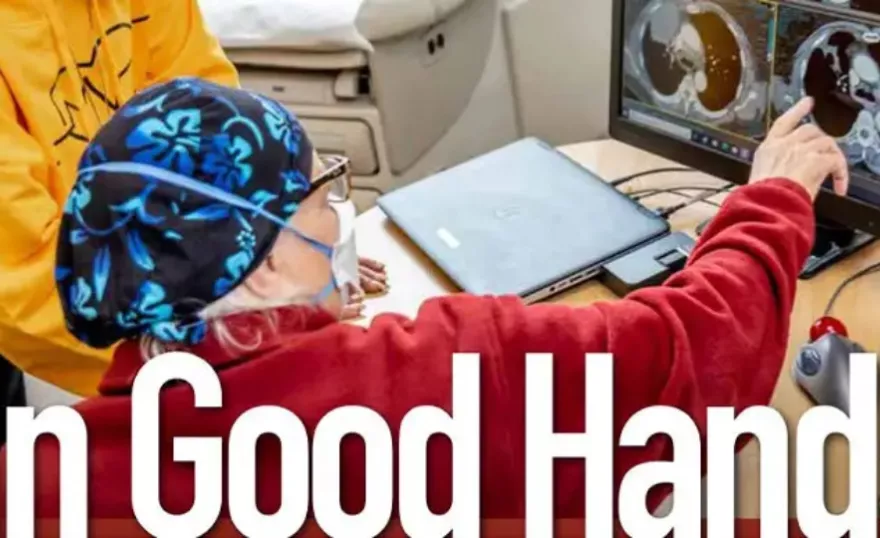General News
“We’ve found a spot on your lung.” Those words can strike fear into the heart of even the bravest among us. Could it be cancer? Will I need to have surgery? What if it gets bigger? What do I do now? “The scariest thing for patients is the unknown,” said Carol Pyne, RN, OCN, Nurse Navigator at Cape Fear Valley Health’s Lung Nodule Clinic. “That’s what makes this clinic great. Just to have some information and a plan relieves a lot of stress.” Located in the Cape Fear Valley Cancer Treatment and CyberKnife Center, the Lung Nodule Clinic was created to guide patients seamlessly through the process of diagnosis and treatment. Patients are referred to the clinic when another provider has detected a worrisome spot that needs further investigation.The investigation is aided significantly by a Veran SPiN System, computer technology that generates a precise, three- dimensional map of the lungs to ensure accurate location of the affected area. This enables a much more accurate biopsy, with minimal disruption of surrounding tissues. It’s a bit like navigating a road trip with GPS instead of outdated road maps – there is significantly less error and less waste of valuable time. “When I first started out in my career, we just had chest X-rays,” said Irlene Locklear, M.D., a pulmonologist who advocated for the upgrade to this new technology. “The Veran system can diagnose much smaller lesions, things we never would have seen back then. Now we can get patients diagnosed and treated in much less time.” For Renee Johnson Edwards of Fayetteville, time was especially precious. She had gone to the doctor with a persistent cough that was producing blood. A smoker for 40 years, she wasn’t surprised when a chest X-ray showed a mass in one of her lungs. But she was anxious to find out more at the Lung Nodule Clinic. She said the clinic staff helped to keep her spirits up, laughing with her when she realized she still had her boots on after changing into a hospital gown for the biopsy procedure. “I woke up fully dressed and happy,” she said. “It felt good to be in good hands.” Although her smoking history and a family history of cancer had prepared her for the worst, it was still hard to hear: non- small cell lung cancer, stage 3. “I cried for 11 days,” she said. “It was devastating.” Now, after a long course of radiation and chemotherapy, Edwards is happy to report that her cancer is in remission. She’ll still have routine scans to keep an eye on things, but she’s grateful for the guidance and support she found at the Lung Nodule Clinic. “Dr. Locklear and the staff were very welcoming,” she said. “Every time I went in, as soon as I arrived, someone was happy to see me, made sure I was comfortable and answered all my questions.” Making patients comfortable is a large part of Pyne’s role at the clinic, where she is a liaison between patients and providers. She said she’s happy to answer questions and solve problems that come up along the way. “Sometimes patients call just to talk,” she said. She recalled the story of a woman whose lung nodule was discovered while she was in the hospital with COVID-19. The patient knew she would have an appointment at the Lung Nodule Clinic to learn exactly what it was, but not right away. “We couldn’t see her for weeks because we were waiting for the infection to clear,” said Pyne. “But she called once a week or so, just to get some general information and reassurance.” Pyne said it’s common for a lung lesion to be discovered that way, during the treatment of an apparently unrelated issue. If that patient hadn’t been sick with COVID-19, her cancer might not have been found early enough to treat successfully. “Lung cancer is usually asymptomatic until it spreads,” Pyne said. “And even when there are symptoms, sometimes they can be explained away by other causes, like allergies.” That’s why she’s eager to let people know about the importance of lung cancer screenings. In 2013, the U.S. Preventive Services Task Force recommended annual lung cancer screenings for people who are at high risk of developing lung cancer. The screening involves a low-dose computer tomography scan, or CT scan, which generates detailed images of the lungs. These images can then be inspected for any signs of cancer that need a closer look. “With screenings, we can now catch more of these nodules early,” said Locklear. “That’s when hey can be treated more efficiently and quickly.”




